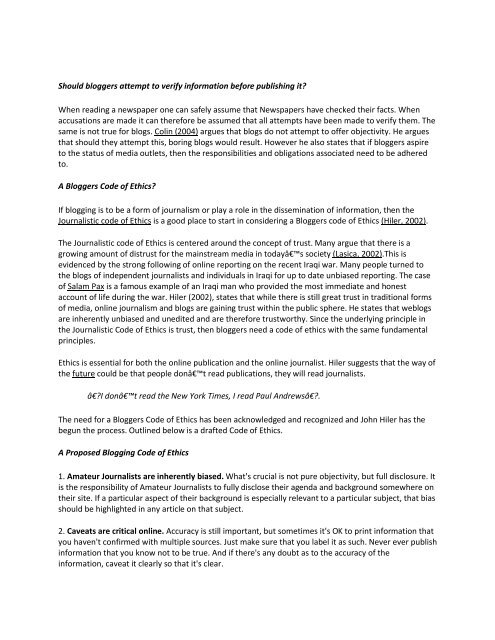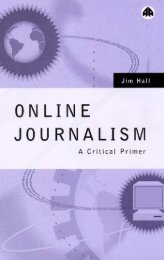Modul Mata Kuliah Journalisme Online - Ayo Menulis FISIP UAJY
Modul Mata Kuliah Journalisme Online - Ayo Menulis FISIP UAJY
Modul Mata Kuliah Journalisme Online - Ayo Menulis FISIP UAJY
Create successful ePaper yourself
Turn your PDF publications into a flip-book with our unique Google optimized e-Paper software.
Should bloggers attempt to verify information before publishing it?<br />
When reading a newspaper one can safely assume that Newspapers have checked their facts. When<br />
accusations are made it can therefore be assumed that all attempts have been made to verify them. The<br />
same is not true for blogs. Colin (2004) argues that blogs do not attempt to offer objectivity. He argues<br />
that should they attempt this, boring blogs would result. However he also states that if bloggers aspire<br />
to the status of media outlets, then the responsibilities and obligations associated need to be adhered<br />
to.<br />
A Bloggers Code of Ethics?<br />
If blogging is to be a form of journalism or play a role in the dissemination of information, then the<br />
Journalistic code of Ethics is a good place to start in considering a Bloggers code of Ethics (Hiler, 2002).<br />
The Journalistic code of Ethics is centered around the concept of trust. Many argue that there is a<br />
growing amount of distrust for the mainstream media in todayâ€s society (Lasica, 2002).This is<br />
evidenced by the strong following of online reporting on the recent Iraqi war. Many people turned to<br />
the blogs of independent journalists and individuals in Iraqi for up to date unbiased reporting. The case<br />
of Salam Pax is a famous example of an Iraqi man who provided the most immediate and honest<br />
account of life during the war. Hiler (2002), states that while there is still great trust in traditional forms<br />
of media, online journalism and blogs are gaining trust within the public sphere. He states that weblogs<br />
are inherently unbiased and unedited and are therefore trustworthy. Since the underlying principle in<br />
the Journalistic Code of Ethics is trust, then bloggers need a code of ethics with the same fundamental<br />
principles.<br />
Ethics is essential for both the online publication and the online journalist. Hiler suggests that the way of<br />
the future could be that people donâ€t read publications, they will read journalists.<br />
â€?I donâ€t read the New York Times, I read Paul Andrewsâ€?.<br />
The need for a Bloggers Code of Ethics has been acknowledged and recognized and John Hiler has the<br />
begun the process. Outlined below is a drafted Code of Ethics.<br />
A Proposed Blogging Code of Ethics<br />
1. Amateur Journalists are inherently biased. What's crucial is not pure objectivity, but full disclosure. It<br />
is the responsibility of Amateur Journalists to fully disclose their agenda and background somewhere on<br />
their site. If a particular aspect of their background is especially relevant to a particular subject, that bias<br />
should be highlighted in any article on that subject.<br />
2. Caveats are critical online. Accuracy is still important, but sometimes it's OK to print information that<br />
you haven't confirmed with multiple sources. Just make sure that you label it as such. Never ever publish<br />
information that you know not to be true. And if there's any doubt as to the accuracy of the<br />
information, caveat it clearly so that it's clear.
















